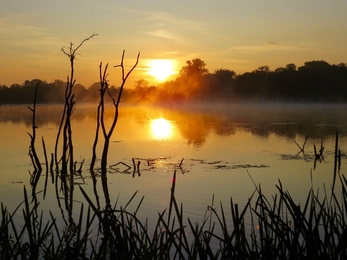CEOs from 32 nature organisations have today written to Defra Secretary of State Steve Reed and Housing Minister Matthew Pennycook, issuing a warning over new planning laws. They warn that if the proposed Planning and Infrastructure Bill proceeds unchanged, it will break new ground in the destruction of nature across England.
They are calling on Ministers to work with environmental groups to deliver the ‘win-win’ scenario that was originally promised by the Government when the Bill was announced. They are urging Government to support amendments to the Bill which would protect nature and deliver sustainable development for generations to come.
The letter, signed by leading conservation organisations, including The Wildlife Trusts, Woodland Trust, RSPB, National Trust, WWT, Rivers Trust and Marine Conservation Society makes it clear that the proposals, in their current form, would significantly weaken environmental law.
This could push species towards extinction, lead to irreversible habitat loss, and would make it less likely for the Government to meet its legally binding Environment Act targets. It could also significantly affect local communities with issues such as more sewage in rivers, greater flood risk and loss of valued local parks, woodlands, and river and wetland walks.
The signatories argue that the Bill falls far short of delivering on both nature recovery and responsible development for communities, and could allow developers to effectively disregard environmental rules and community concerns. This would mean that our most protected, valuable and vulnerable sites for nature, such as heathlands, woodlands and wetlands, will no longer have the strong safeguards that they have now, putting them at real risk of damage and destruction from the impacts of new development that will be waived through. [2]
They warn that in its current form, the language around proposed ‘Environmental Development Plans’ is not strong enough to actually deliver the promised benefits and could allow developers to ignore environmental requirements and scientific evidence and provide no guarantees that substantial nature recovery work will take place.
They also warn that the legislation may significantly weaken Habitat Regulations, rules which have helped to effectively protect wildlife for decades. In so doing the Bill risks stripping away vital protections without clear requirements on developers to deliver the nature restoration needed to bring iconic landscapes such as chalk streams, wildflower meadows and ancient woodlands back to life and to protect treasured species like hazel dormice, otters and struggling bird and butterfly species.
The warning comes as recent polling found that 71% of Brits would support increased planning protections for green and blue spaces, including fields, woodland, community parks, national parks, rivers, lakes and streams. Only 12% think current planning rules go too far in protecting the country’s natural spaces and wildlife – showing the Government’s position on nature as a blocker of development is out of touch with public opinion. [3]
Richard Benwell, CEO of Wildlife and Countryside Link said, “The Government is right that a win-win is possible for nature and development, but the Planning Bill is completely one-sided. It throws environmental protection to the wind, with little to offer future generations or communities fearful for the future of nature. It would leave vulnerable species and irreplaceable habitats like chalk streams and ancient woodlands more exposed than ever to unsustainable development. Promises of nature recovery efforts in return are thin and uncertain.”
“Ministers must strengthen safeguards to ensure development can’t proceed without every effort to avoid harm to protected wildlife, that rigorous science informs decision-making, and that compensation for damage isn’t kicked years into the future. The Government thinks these proposals will save lots of time and money for developers, so the law should guarantee a decent proportion is reinvested in nature. It shouldn’t just offset harm, but make a significant contribution to restoring our natural world. Ultimately, that will lead to developments that are greener and safer, and help solve the environmental problems that the law is trying to tackle”.
Craig Bennett, chief executive of The Wildlife Trusts, says: “As it stands, the limited safeguards for nature in the Planning and Infrastructure Bill merely undermine nature protection laws and threaten the constructive dialogue of The Wildlife Trusts and environmental groups with Defra and the Ministry for Housing Communities and Local Government.
Without significant amendments to the Bill, any attempts to take a more strategic approach to addressing environmental impacts of development in support of nature’s recovery are dead in the water.”
Beccy Speight, RSPB Chief Executive, said: “We were promised legislation that would deliver a win-win for nature and economic growth, but by stripping out essential protections for nature, this Bill offers neither. Unamended, it will supercharge the decline of our most precious habitats and wildlife.
“Investing in nature makes clear economic sense. Taking a wrecking ball to the very thing the economy and supply chains depend on does not. The UK Government must urgently address the Bill’s key failings and instead of weakening protections, prioritise avoiding harm, base decisions on science, and guarantee upfront environmental benefits that will see nature restored at scale.”







